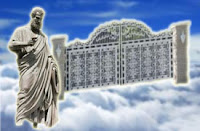Since we are now in the middle of the Lenten season, I
wanted to discuss what is called “The Seven Last Words of Christ.” As Jesus hung dying on the cross he made
seven statements. Each statement is
referred to as a “word.” The first three
words were said between 9AM and noon, and the last four were said close to 3PM. You cannot find a list of these words in the
Bible in the same way that you find the Ten Commandments, but they are
there. The purpose of this blog post is
to tell you what these words are and where you can find them.
The first statement, “Father forgive them, for they do not
know what they are doing,” is recorded in Luke 23:34. Since the entire reason for Jesus’ death on
the cross was to grant forgiveness for their sins to everyone who believes and
trusts in him, Jesus has established that purpose with this statement.
The second statement, “I tell you the truth, today you will
be with me in paradise,” is recorded in Luke 23:43. This promise given to a penitent thief gives
us a look into the future and tells us what happens after a believer’s death.
The third statement, “…he said to his mother, ‘Dear woman,
here is your son,’ and to the disciple, ‘Here is your mother,’” is recorded in
John 19:26-27. With this statement Jesus
provided for the care of his mother by his disciple John. From that day forward Mary lived in John’s
home and he provided for her.
The last four statements were said close together at
3PM. The fourth statement, “My God, my
God, why have you forsaken me?” is recorded in Mark 15:34 and Matthew 27:46. This was a cry expressing the emotional pain
that Jesus felt as he alone took on his shoulders the sins of the entire world.
The fifth statement, “I am thirsty,” is recorded in John 19:28. This was an expression of physical pain and
his lips were moistened with some wine vinegar.
This was the drink of the ordinary people at that time.
After being given the drink Jesus uttered the sixth
statement, “It is finished,” which is recorded in John 19:30. This was not a cry of defeat but rather a cry
of victory. Jesus had completed what he
had come to do. Salvation was available
for everyone who believed and trusted in him.
With that Jesus said, “Father, into your hands I commit my
spirit,” recorded in Luke 23:46, the seventh and last statement.
These words are extremely important.
They were made while Jesus was completing the
final steps for our salvation.
This was
something that no one before or since could accomplish.
For this reason I have included these words
and their location under our page titled “
Things to Know.”






